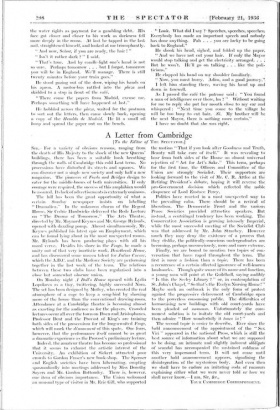A Letter from Cambridge
[TO the Editor Of THE SPECTATOR.]" Slit,— For a variety of obvious reasons, ranging from. the death of His Majesty to the shock of the new Queens' buildings, there has been a suitable hush breathing through the walls of Cambridge this cold Lent term. No processions have disturbed its streets and squares. We van discover not a single new society and only half a new Magazine. The- pioneers; of Fords and Bridges design to cater for the middle-brows of both universities. If only courage were required, the success of this amphibian would lit • assured. IN hick of advert iseMents is extremely ominous.
The lull has been the great -opportunity of what a certain Sunday newspaper insists on labelling '" Dramatica." In the unknown charm of the Regent House. Sir Cedric Hardwicke delivered the Rede Lecture :on " The Drama of Tomorrow." The Arts Theatre, _directed by Mr. Maynard Keynes and Mr. George R.ylands, opened with dazzliiig pomp. Almost simultaneously, Mr. :Keynes published his latest epic on Employment, which can be found lying about in the most unexpected rooms. Mr. Rylands has been producing plays with all his usual verve. Besides his share in the Frogs, he made a unity out of that very inartistic work, Heartbreak house, and has discovered some unseen talent for Julius Caesar, which the A.D.C. and the Marlowe Society arc performing together in the last week of the term. The relations between these two clubs have been regularised into 'a dose but somewhat obscure union.
On Monday night .1 Doll's House opened with Lydia Lopokova as a tiny, twittering, highly successful Nora. The set. has been designed by Motley, who created the real atmosphere of a cage to .keep a song-bird by showing more of the house than the conventional drawing-room. Attendance at a Cambridge theatre is becoming almost - as exacting for the audience as for the players. Crowded lectures occur all over the town on Ibsen and Aristophanes. 'Professor Dent and the Provost of King's arc training both sides of the 'proscenium for the long-awaited 'Frogs, which will mark the denouement of this spate. One fears, however, that the performance itself cannot be as great it dramatic experience as the Provost's preliminary lecture.
Indeed, the amateur theatre has become so professional that it seems to exhaust the artistic interest of the University. An exhibition of Sickert attracted poor crowds to Gordon Fraser's new book-shop. The Spenser' and English societies have been hibernating, erupting spasmodically into meetings addressed by Miss Dorothy Sayers and Mr. Gordon Bottomley. There is, however, one item of obvious importance. The Union welcomed an unusual type of visitor in Mr. Eric Gill, who supported the motion ".That if you look after Goodness and Truth, Beauty. will take care of -itself." It was revealing to hear from- both sides of the House an almost universal rejection. of ." Art for Art's -Sake." This.- term, perhaps- for the first time, the Officers and Committee of the Union arc strongly Socialist. Their SuPporters. . are looking forward to the visit of Mr. C. R, -Attlee at the Retiring President's debate, hoping it will .reverse the pro-Government decision which • reflected the noble eloquence of LOrd Eustace Percy. • 1 • Politics have reacted. in 'a most unexpected way to the prevailing calm. There should be a revival of liberalism. The Democratic Front -and the various Peace Societies provided attractive speakers. But instead, a centrifugal tendency has been working. The Conservative Association is growing intensely Imperial, while the most 'successful meeting of the Socialist Chili was that addressed. by Mr. John Strachey. However much they may deny .the existence of a 'proCess that they dislike, the politically-conscious undergraduateS are becomhig, perhaps unconsciously, more and more extreme: Finally, we are bound to mention two topics of eon- versation that have raged throughout the term. The 'first is more a fashion than a topic. There has been a recurrence of a certain affected ignorance of well-known landmarks. Though quite aware of its name and function, a young mail will point at the Guildhall, saying audibly " Is this the Seeley Library ? " or, in contemplation of St. John's Chapel, "So that's the Evelyn Nursing Home ! " Maybe such an outbreak is the only form of protest against the progressive defacement of Cambridge open to the powerless consuming public. The difficulties of harmonising new buildings with old court-yards have been pleaded. ad nauseam. Unfortunately the corn: monest solution is to imitate the old court-yards and then admire " How wonderfully it tones in I" The second topic is easier to describe. Ever since the -bald announcement of the appointment of the " Sex Viii " appeared in the national Press, which is still the best source of information about what we are supposed to be doing, an intimate and slightly indecent obbligato of scandal has accompanied the sustained coldness of -this very impersonal term. It will not cease until another bald announcement appears, signalising the disintegration of the mysterious body. And even then we shall have to endure an irritating coda of rumours 'explaining either what we were never told or how we -shall never know.—I ant, Sir, &e.,
" YOUR CAMBRIDGE CORRESPONDENT.














































 Previous page
Previous page